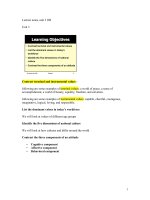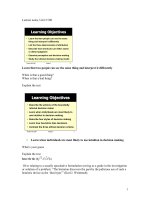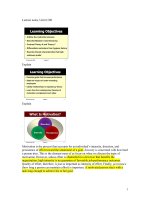Organizational behavior: Lecture 27 - Dr. Mukhtar Ahmed
Bạn đang xem bản rút gọn của tài liệu. Xem và tải ngay bản đầy đủ của tài liệu tại đây (467.89 KB, 53 trang )
Organizational
Behavior
(MGT-502)
Lecture-27
Summary
of
Lecture-26
Definition - Conflict
• "a process which begins when one
party perceives that the other is
frustrated, or is about to frustrate,
some concern of his (or her).
Definition of Conflict
• Perceived by the parties
• Parties are in opposition to one another
• At least one party is blocking the goal
attainment of the other party
• Goals can be tangible or psychological
– Money
– Task Achievement
– Happiness
Types of Conflict
Task conflict
Conflict over content and
goals of the work
Relationship conflict
Conflict based on
interpersonal relationships
Process conflict
Conflict over how work gets
done
Levels and Types of
Conflict
Level of conflict
Organization
Group
Individual
Type of conflict
Within and between organizations
Within and between groups
Within and between individuals
Sources of conflict
• Organizational hierarchy
• Competition for scarce resources
• Self-image & stereotypical views of others
• Differing goals & objectives
• Failures & resultant blame fixing
• Poor coordination of activities
Is Conflict Bad?
• Traditional View
• Human Relations
• Interactionist
Today’s Topics
Conflict Management
Conflict at Work
Conflict Management Styles
Avoiding - deliberate decision to take no
action on a conflict or to stay out of a
conflict
Accommodating - concern that the other
party’s goals be met but relatively
unconcerned with getting own way
Competing - satisfying own interests;
willing to do so at other party’s expense
Conflict Management Styles
Compromising - each party gives up
something to reach a solution
Collaborating - arriving at a solution
agreeable to all through open &
thorough discussion
Collaborating
Competing
Compromising
Unassertive
Assertiveness
Assertive
Five Conflict Management
Styles
Avoiding
Accommodating
Uncooperative
Cooperative
Cooperativeness
Avoidance Is
Appropriate When...
•You have no chance of
satisfying your concerns
•let people cool down
Accommodation Is
Appropriate When ...
• You realize you are wrong
• Issue is much more important to
other party
• To build up credit for later
negotiations
• To preserve harmony
Competition Is
Appropriate When...
• No long term relationship
• To protect yourself against
untrustworthy parties
• Unpopular courses of action need
implementation
• Issues are vital to your welfare
Collaboration Is
Appropriate When ...
• Both parties’ concerns are too
important to be compromised
• To gain commitment
• Time is not an issue
Compromising Is
Appropriate When ...
• Goals are less important to you
than collaboration
• Mutually exclusive goals
• To achieve temporary
settlements
• Under intense time pressure
Negotiation Skills
What is negotiation?
Negotiation.
–The process of making joint
decisions when the parties
involved have different
preferences.
Negotiation
Negotiation - a joint process of finding a
mutually acceptable solution to a complex
conflict
Useful under these conditions
– Two or more parties
– Conflict of interest between the parties
– Parties are willing to negotiate
– Parties prefer to work together rather than to
fight openly, give in, break off contact, or take
the dispute to a higher authority
Approaches to Negotiation
Distributive Bargaining –
the goals of the parties are in
conflict, and each party seeks
to maximize its resources
Approaches to Negotiation
Integrative Negotiation –
focuses on the merits of the
issues and seeks a win-win
solution
Steps in a Negotiation
Identify the problem
Define the goal
Record the facts
Anticipate outcomes
The Process of
Negotiation
Preparation
and Planning
Clarification and
Justification
Closure and
Implementation
Definition of
Ground Rules
Bargaining and
Problem
Solving









